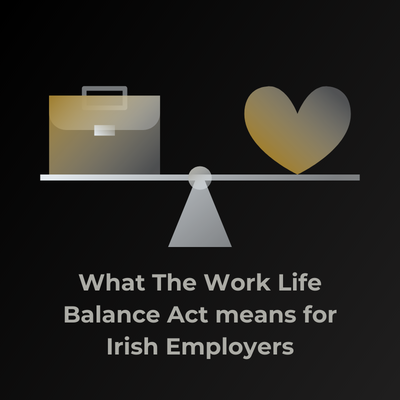What the Work Life Balance Act means for Irish Employers
The Work Life Balance Act 2023 (the Act) constitutes an important milestone in supporting work-life balance and workers’ rights in Ireland. It is fundamental that employers understand the implications and changes to work practices that the Act implements. With its roots firmly based in Europe, this new legislation brings significant changes relating to both working parents and carers, bringing with it amendments to previous legislation as it relates to flexible working and maternity leave; as well as other employment rights.

When does the Work Life Balance Act come into force?
The new Act was signed into law by the President on 4th April 2023. The main aim of the Act is to support the evolving needs of a modern-day workforce and promoting a healthier work-life balance for employees. We saw implementation of leave for medical care purposes, changes to maternity leave access and breast-feeding breaks come into force on 3rd July 2023 and it is anticipated that the outstanding entitlements will come in later in 2023, in addition to a code of practice from WRC, which is widely anticipated. It is thought that WRC code of practice will give clear guidelines for employers to use in relation to employee requests for remote and flexible working and, more generally, in relation to the practical application of those specific provisions of the Act.
What is the purpose of the Act?
The new legislation was designed as part of a far-reaching EU framework, which has workplace diversity and inclusion at its core. It provides a legal entitlement to request flexible working for parents or those who provide care to relations with serious medical requirements. It grants a right for employees to request remote working as well as allowing victims of domestic abuse to statutory paid leave from their employment; a very new departure for both Irish employers and their workforce.
The accommodation of breast-feeding employees has been significantly extended from 26 to 104 weeks and transgender men who obtained a gender recognition certificate have been facilitated in their right to avail of maternity leave under the Act.
What does the Act provide?
The Act provides the following employment rights:
- Unpaid leave of 5 days for medical care purposes for parents of children under 12 and employees with caring responsibilities
- The right to request flexible working for parents and carers
- The right for all employees to request remote working
- 2 year’s breastfeeding breaks
- 5 day’s paid leave for victims of domestic violence
- The right to maternity leave for transgender men
What are the implications of the Work Life Balance Act for Irish Employers?
In order to facilitate this new legislation and the changes which it brings, Employers need to be proactive and ensure their house is in order and that their policies can accommodate the changes implemented by the Act. This could mean an update to staff handbooks as well as review of procedures to ensure that work life-balance for their employees can now be accommodated in keeping with statutory requirements.
Conclusion
Employers large and small across the country will need to review and adapt their policies to facilitate the changing needs of their employees and to accommodate this new Act and the changes which it brings. Many Employers will find it beneficial to seek support in relation to this new legislation from an experienced HR Consultant, who can advise on updates and reviews which their policies and handbooks may require and most importantly, to ensure that their organisation is fully complaint.
Get in touch with Action HR Services if you would like further information on the services we offer. Our HR Specialists are happy to support you in your HR business needs.
DISCLAIMER:
The information in this article is provided as part of the Action HR Services Blog. Specific queries should be directed to a member of the Action HR Services Team and it is recommended that professional advice is obtained before relying on information supplied anywhere within this article. This article is correct on 23rd August 2023.
